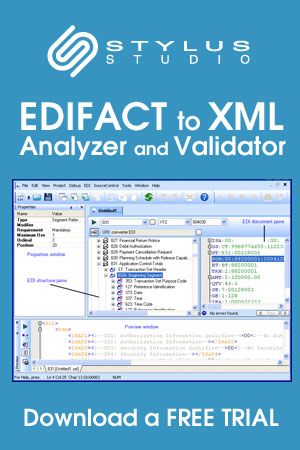

|
Return to Stylus Studio EDIFACT home page. Return to Stylus Studio EDIFACT D04B Messages page. Travel, tourism and leisure product application status request - interactive message
0. INTRODUCTIONThis specification provides the definition of the Travel, tourism and leisure product application status request - interactive message (PASREQ) to be used in Electronic Data Interchange (EDI) between trading partners involved in administration, commerce and transport. 1. SCOPE1.1. Functional definitionThe Travel, tourism and leisure product application status request message is sent by either a service supplier to a product supplier to ask if the application or product is available for request or by a product supplier to a service supplier to notify them that they will not be receiving requests during a specified time period. 1.2. Field of applicationThe Travel, tourism and leisure product application status request - interactive message may be used for both national and international applications. It is based on universal practice related to administration, commerce and transport, and is not dependent on the type of business or industry. 1.3. PrinciplesPASREQ may be used for the following functions that facilitate the operation of the interactive scenario for travel, tourism and leisure: (1) to ask the supplier of a service or product if the application is available for requests. The request may specify an application, a message type, a scenario, and a dialogue type. (2) to notify a service supplier, such as a travel agent system, that they will not be taking requests for a specific application(s), message type, scenario, or dialogue type, or from specific agents based on location. (3) to ask the service supplier, such as a travel agent system, if they can send a message to update their data base. 2. REFERENCESSee UNTDID, Part 4, Chapter 2.3 UN/ECE UNSM - General Introduction, Section 1. 3. TERMS AND DEFINITIONS3.1. Standard terms and definitionsSee UNTDID, Part 4, Chapter 2.3 UN/ECE UNSM - General Introduction, Section 2. 4. MESSAGE DEFINITION4.1. Segment clarificationThis section should be read in conjunction with the segment table which indicates mandatory, conditional and repeating requirements. 0010 UIH, Interactive message headerA service segment starting and uniquely identifying a message. The message type code for the Travel, tourism and leisure product application status request - interactive message is PASREQ. Note: Travel, tourism and leisure product application status request - interactive messages conforming to this document must contain the following data in segment UIH, composite S306:
0020 ORG, Originator of request detailsA segment providing data pertaining to the originator of the interactive request (e.g., travel agent identity and location and the commercial computer reservations system delivering the message). 0030 Segment Group 1: MAP-DTI-NUN-SG2-SG3A group of segments to specify the message application information and effective dates and times. 0040 MAP, Message application product informationA segment to specify the action to be taken, the message, scenario, and dialogue affected, and the supplier of the product. 0050 DTI, Date and time informationA segment to specify start and stop dates and times for the action. 0060 NUN, Number of unitsA segment to indicate the number of records or messages that a supplier has to send in a data base update message. 0070 Segment Group 2: TVL-DTIA group of segments to specify the products that are affected by the action and the related effective dates and times. 0080 TVL, Travel product informationA segment to identify the products or services that are affected. 0090 DTI, Date and time informationA segment to specify the start and stop dates and times for the action. 0100 Segment Group 3: POS-DTI-SG4A group of segments to specify the travel agencies and locations that might be affected by the action and the effective dates. 0110 POS, Point of sale informationA segment to specify the travel agencies by identification numbers and the locations that are affected. 0120 DTI, Date and time informationA segment to specify the start and stop dates and times for the action for specific agencies and locations. 0130 Segment Group 4: TVL-DTIA group of segments to identify the product or service and the start and stop date and time. 0140 TVL, Travel product informationA segment to identify the product or service that is affected for the point of sale information. 0150 DTI, Date and time informationA segment to specify the start and stop dates and times. 0160 UIT, Interactive message trailerA service segment ending a message, giving the total number of segments in the message (including the UIH & UIT) and the control reference number of the message. 4.2. Segment index (alphabetical sequence by tag)
4.3. Message structure4.3.1. Segment table
Return to Stylus Studio EDIFACT D04B Messages page. |

|
| Site Map | Privacy Policy | Terms of Use | Trademarks |